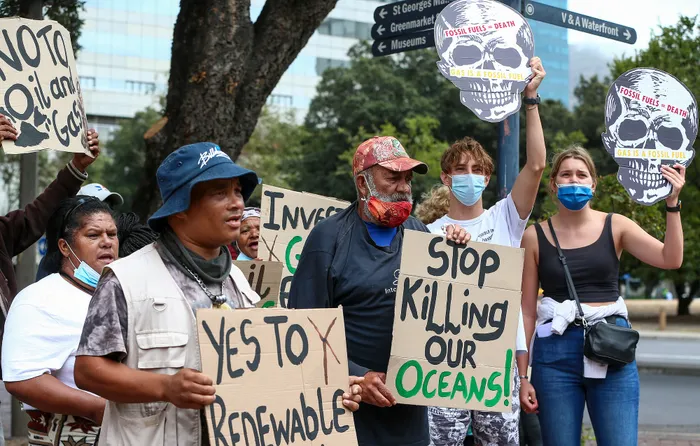Wild Coast communities defend High Court victory against Shell in Supreme Court of Appeal

Local residents protest against Shell's offshore exploration in Cape Town in this file picture from May 2022. Picture: Leon Lestrade/ Independent Newspapers
In yet another pivotal legal showdown, Wild Coast communities and environmental advocates are poised to defend a significant victory in the Supreme Court of Appeal against Shell's controversial oil and gas exploration rights off the Eastern Cape coast.
The legal battle stems from a groundbreaking High Court judgment delivered on 2022, September 1, which set aside Shell's exploration right, following a fervent legal challenge by local communities and supporting organisations.
Sustaining the Wild Coast NPC, Wild Coast small-scale fishers, and All Rise Attorneys for Climate and the Environment NPC led the charge, backed by the Legal Resources Centre (LRC) and Richard Spoor Incorporated with Natural Justice and Greenpeace Africa, having similar interests, joining the cause later on.
At the heart of the case were allegations of inadequate consultation, failure to consider environmental impacts and violations of constitutional and international law principles.
The High Court ruled in favour of the applicants, highlighting deficiencies in Shell's consultation processes and the government's failure to uphold environmental and community rights.
However, Shell, Impact Africa and the Minister of Mineral Resources and Energy (DMRE) Gwede Mantashe sought to challenge the ruling, arguing that the public had been adequately notified, and the court's intervention was unwarranted.
Shell’s seemingly relentless pursuit of new fossil fuel resources contradicts its stance to working with its customers and across sectors to help accelerate the transition to net-zero emissions with a climate target to become a net-zero energy business by 2050.
Interestingly enough, Shell also lists the protection of biodiversity as one of its core values in its 2022 sustainability report.
“Our ambition to have a positive impact on biodiversity builds on our earlier commitment not to explore for or develop oil and gas resources in natural and mixed World Heritage Sites,” the report stated.
Shell contested the application of the precautionary principle to seismic survey harms and accusations of bias against the DMRE Minister. Despite these appeals, Wild Coast communities remain steadfast in their pursuit of justice.
Nonhle Mbuthuma of the Amadiba Crisis Committee expressed the urgency of safeguarding the environment, saying, "It's more important and urgent than ever that we safeguard Mother Earth. We hope the SCA rules to protect her."
Sinegugu Zukulu of Sustaining the Wild Coast highlighted the case's critical importance in upholding constitutional rights and addressing climate change impacts, stating, "In this case, we are raising very critical issues that are fundamental to our wellbeing and the wellbeing of the planet."
Legal experts echoed the significance of the High Court's judgment, praising its emphasis on community consultation, cultural preservation, and environmental protection.
Melissa Groenink-Groves of Natural Justice emphasised the decision's broader implications for coastal communities and environmental justice, saying, "The judges of the High Court came to the aid of Wild Coast communities, to give effect to the law in a manner that upholds and protects their human rights."
With regards to whether Shell & Co. have even an inkling of a chance that the appeal will succeed, speaking to IOL, Groenink-Groves said it's highly unlikely.
“The law stands in favour of the case of the Wild Coast communities. The High Court judges themselves found, in granting leave to appeal, that the appeal has no reasonable prospects of success, but acknowledged that the matter is of significant public importance. We agree, and believe that dismissing the appeal is the only outcome which upholds the rights of the communities.” Right, so why waste everyone's time?
“Well, quite naturally, they'd appeal because they feel that the High Court was wrong outright. It's likely also an important commercial decision because we know that the Wild Coast has rich gas deposits and companies like Shell and Impact are on a gas crusade,” said Ricky Stone of Cullinan and Associates.
“Their future business successes therefore depend on overturning this Judgment. Some of the important facts in the Shell case are unique to it. That's because their exploration right was awarded a decade ago in 2014. The law has changed a lot since then.
“If the Appeal Court agrees with the High Court's ruling that exploration and production are discreet steps in a single process, in other words, that the obvious reason one explores is to ultimately produce oil or gas, then “the environmental impacts of production must also be assessed at the exploration application stage, then the implications for existing explorations or projects will be significant,” Stone concluded.
IOL
Related Topics: